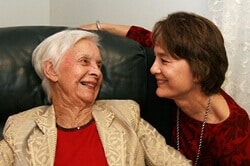Feel Comfortable When Visiting Grandma in the Nursing Home

By Jack Jones
It’s Christmastime again — and that usually includes visiting family who you may only see infrequently. For some, a family member may live in a nursing home or assisted living facility. Because of inexperience, some people feel so uncomfortable at nursing homes that they avoid visiting loved ones who live there. Some people find it depressing; others just don’t know what to say. It can be awkward, but if you are prepared, it can be a meaningful time for both of you.
It is helpful to call ahead to find out what would be the best time to visit. There may be certain times of the day when your loved one feels more energetic. Visiting at those times will contribute to a positive visit. Above all, do not promise to come and then fail to show up. If you cannot make it, call ahead and schedule an alternate day for your visit. Don’t assume that your loved one won’t remember that you were coming. Looking forward to a visit adds to its pleasure. Often visits are the highpoint of the week and residents are very disappointed if a visitor does not show up. No one likes to be stood up. Rescheduling will reassure them that they were not simply forgotten.
A key to feeling comfortable during your visit is to look at each resident of the nursing home as a unique and interesting personality. Many of them have photos of themselves when they were younger. Spend time looking at the photos and listen to stories of what their lives were like then. It will help you to see each person as an individual with a contribution, and not merely a victim of time or circumstance.
Bring along with you something that the two of you can do together. This helps reduce awkward silences and gives your loved one something positive to focus on, which will likely cut down on complaints and pleas to go home — two things visitors fear they will encounter. It will be more natural if you can include some enjoyable activity that you did together previously: watch a favorite show, play games, or work on a crossword puzzle. Find something that is appropriate for their current abilities and do it with them. Contact nursing home staff for suggestions. Another idea is to bring along an old family scrapbook and relive the memories together. Bring recent family photos or videos to help them feel like they are still part of the family. Some people avoid talking about home and happier times with nursing home residents for fear of making them sad. On the contrary, it can create a connection with you now that may boost their mood.
Don’t forget the power of physical touch. Touching tells others that they are loved and accepted. Hold your loved one’s hand and offer hugs. Even people who are comatose benefit from touch, and people in the final stages of Alzheimer’s respond to kindness and affection.
Let’s look at the example of Christ in a potentially difficult encounter. Jesus is in Samaria, even though Jews never ventured there because of the age-old rift between the two nations. He is sitting at a well when a Samaritan woman appears. First, He opens a conversation by asking her a favor, for a drink of water (John 4:7). In the same way, when the relatively independent one (you) asks a favor of the relatively dependent one (your loved one), some barriers are broken. Although you probably don’t think of yourself as superior to your loved one, in some ways they may. When you say to them, “I need something that you can give,” you are setting aside your independence and placing your loved one on equal ground with you. The humiliating burden of dependency is lightened — “I am needed and have something to give.” Practical application of this in a nursing home visit might be, “Grandma, I was too young at the time to understand why you and Grandpa gave up the dairy farm and planted pines. Now I am facing a life-changing decision myself. Can you tell me how you made that big decision?”
The conversation Jesus began by asking for a drink of water led to a deep discussion about what the woman really needed, and gave Him the opportunity to respond with an offer of meaningful help (John 4:10, 14). Jesus could offer himself as the ultimate satisfaction of her deepest needs. You too, can offer Christ’s help through joining in prayer for specific spiritual or physical needs or by reading passages of scripture with them.
In addition, through conversation, you can learn about practical needs that you may be able to meet. Once, in a conversation about electric razors, I found out that a resident had one that was “broken.” In that case, because my vision is better, it took only a few minutes for me to “repair” the razor by reassembling the parts correctly. My technical genius was praised far beyond my actual razor repair skill, but it met a need that the resident was experiencing.
As relationships deepen through repeated times together, many other kinds of mutually beneficial exchanges come about. I frequently hear nursing home visitors tell of the blessings they receive as they visit. Every day I receive such blessings. You can too. As you become more comfortable with your loved one and their current home, hopefully the infrequent “holiday visits” will turn into frequent “regular visits.”
About the author: Jack Jones has been a plumber, a missionary, a nursing home administrator, a pastor, and has been the chaplain at Advent Christian Village’s Good Samaritan Center and Dacier Manor since 1999. Jack married his wife, Connie, over 50 years ago, and together, they raised four children and now have 11 grandchildren. The Joneses shared their home with Connie’s parents during their final years and now share their home with their youngest daughter’s family in anticipation of being in-home care recipients in years to come.



